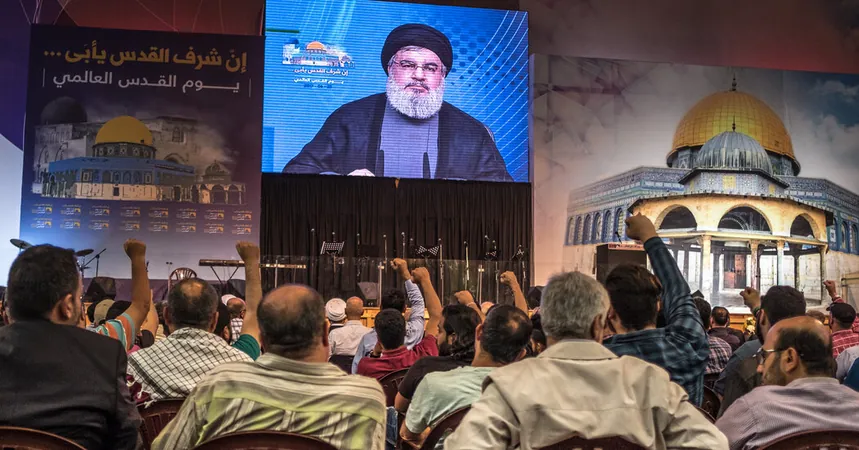
Major Escalation: Hezbollah's Leader Hassan Nasrallah Confirmed Killed in Israeli Attacks
2024-09-28
Introduction
In a shocking turn of events, Hezbollah has confirmed the death of its leader, Hassan Nasrallah, in an Israeli airstrike on Saturday, marking a critical escalation in the ongoing conflict between Israel and Iranian-backed forces in the region.
Implications of Nasrallah's Death
The implications of Nasrallah's assassination are immense, threatening to escalate the existing tensions into a broader conflict across the Middle East. Analysts warn that the act could provoke a catastrophic response from Iran and its allies. “Iran’s potential responses span a range of unacceptable actions. If Hezbollah lacks the military capacity to retaliate effectively, Iran might resort to pursuing nuclear capabilities as its last line of defense,” cautioned Julien Barnes-Dacey of the European Council on Foreign Relations.
The Symbolism of Nasrallah
Nasrallah was not just a leader but a symbol of resistance against Israel, and his death represents a significant strategic blow for Iran. The Lebanese group, known for its militant operations against Israel, has lost a figure historically tied to anti-Israeli sentiment and closely aligned with Iranian Supreme Leader Ayatollah Ali Khamenei, who expressed his condolences and called upon all Muslims to resist against Israel fiercely.
Israeli Operations Against Hezbollah
This incident follows a series of Israeli operations aimed at crippling Hezbollah's military capabilities. Over recent weeks, Israel has systematically targeted the organization, starting with airstrikes on weapons supply facilities and sophisticated sabotage operations aimed at disrupting Hezbollah's communication systems. The IDF's actions are reportedly part of a broader strategy to impair Hezbollah's operational capabilities significantly. Since these strikes began, more than 700 individuals, including civilians, have lost their lives.
Historical Context
In a chilling parallel to history, this is not the first time Israel has successfully struck at the heart of Hezbollah's command. The assassination of Nasrallah recalls the death of his predecessor, Abbas al-Musawi, in 1992, which similarly aimed to destabilize Hezbollah. Historically, such assassinations have often made militant groups more radical and dangerous.
Impact on Civilians and Residents
The Israeli military had previously warned residents in the Dahiya neighborhood of Beirut, a Hezbollah stronghold, to evacuate. As bombings intensified, many fled their homes with little more than the clothes on their backs. The impact has left the area eerily vacant, punctuated by the chaos of smashed buildings and swirling debris. Some residents expressed grim determination, asserting their commitment to the resistance despite the overwhelming fears and destruction.
Regional Dynamics
Meanwhile, regional dynamics are shifting. Many communities in Sunni-majority areas around Lebanon and Syria have appeared to celebrate Nasrallah's death, reflecting deep-seated sectarian divisions. Opposition from Syrian communities and beyond highlight a complex network of alliances and enmities, leading to a complicated aftermath that extends far outside Lebanon’s borders.
Potential Iranian Response
While Tehran, which has heavily invested in Hezbollah, remains cautious, the marked death of such a prominent figure raises fears of retaliation that could drag the entire region into a deeper military confrontation with Israel. Paul Salem from the Middle East Institute suggested that Iran may choose a more calculated long-term strategy rather than an immediate violent escalation. "Iran may focus on quietly reinforcing Hezbollah’s capabilities over time, avoiding direct confrontation as it considers its broader interests," Salem stated.
Conclusion
As the conflict deepens, the question remains: how will Hezbollah respond, and will Iran leverage Nasrallah's death to accelerate its nuclear program? The palpable tension in the region suggests that this is merely the beginning of a volatile new chapter in Middle Eastern geopolitics.



 Brasil (PT)
Brasil (PT)
 Canada (EN)
Canada (EN)
 Chile (ES)
Chile (ES)
 España (ES)
España (ES)
 France (FR)
France (FR)
 Hong Kong (EN)
Hong Kong (EN)
 Italia (IT)
Italia (IT)
 日本 (JA)
日本 (JA)
 Magyarország (HU)
Magyarország (HU)
 Norge (NO)
Norge (NO)
 Polska (PL)
Polska (PL)
 Schweiz (DE)
Schweiz (DE)
 Singapore (EN)
Singapore (EN)
 Sverige (SV)
Sverige (SV)
 Suomi (FI)
Suomi (FI)
 Türkiye (TR)
Türkiye (TR)